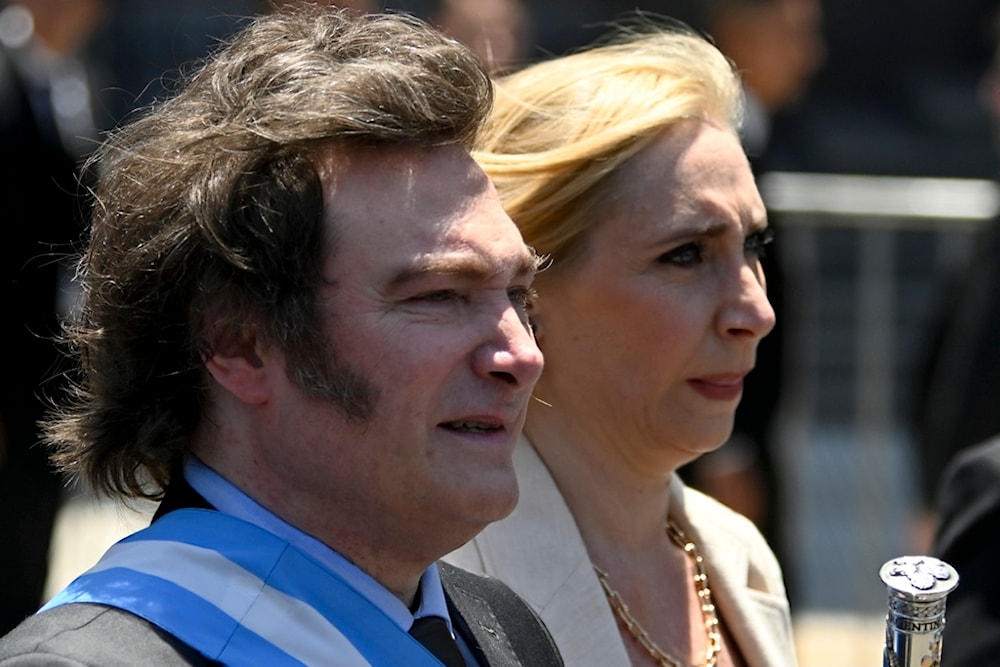China suspends $6.5Bln currency swap with dollar-strapped Argentina
The move comes only 10 days into the tenure of the new president, who campaigned on severing connections with China.
-

Argentina's newly sworn-in President Javier Milei, left, and his sister Karina arrive to the government house in Buenos Aires, Argentina, Sunday, Dec. 10, 2023 (AP Photo/Julian Bongiovanni)
China has reportedly halted a $6.5 billion currency swap deal with Argentina, and the suspension will persist until President Javier Milei demonstrates a clear commitment to engaging with Beijing, as per Argentine media reports.
The move comes only 10 days into the tenure of the new president, who campaigned on severing connections with China. This emphasizes the challenge that Milei will encounter in attempting to fulfill those campaign promises.
Asked to confirm the reports, Zhicheng Xie, the spokesperson for the Chinese embassy in Argentina, refused to do so.
Likewise in Beijing, Chinese Foreign Ministry spokesperson Wang Wenbin declined to either confirm or deny the reports. He stated that China remains dedicated "to cooperation with Argentina on the basis of equality and mutual benefit."
This funding is part of an agreement renewed on an annual basis since 2009, proving crucial for Buenos Aires given its limited holdings of dollar reserves. Argentina has leaned on such swaps as one of its limited credit options, particularly in light of the nation's historical tendency to default on international debt.
Read more: Argentina's Milei orders deregulation of economy, thousands in protest
China initially committed these funds in October, assuring former Argentine Economic Minister Sergio Massa, that the primary purpose was to enhance imports and fulfill obligations to the International Monetary Fund.
During that period, Massa, who was also a presidential candidate, lost to Milei. But following Milei's inauguration on December 10, he reportedly contacted Chinese President Xi Jinping, expressing his interest in maintaining those agreements, as reported by Pagina 12, an Argentine newspaper.
Shortly after, Argentina's Foreign Affairs Minister, Diana Mondino, held a meeting with Wu Weihua, who was Xi's special envoy to the inauguration. During the meeting, Mondino advocated for a prompt renewal of the agreement.
As reported by Argentine news website Infobae, China's decision to suspend the currency swap agreement was triggered by Argentina's purchase of used F-16 fighters from Denmark, originally manufactured in the US. While the deal confirmation is yet to be officially announced, Infobae noted that Argentina's Defense Minister, Luis Petri, met with Xavier Julian Isaac, the Brigadier General of its air force, on Monday to affirm Milei's intention to acquire the F-16s.
Before Milei's presidency, Argentina had been in discussions to acquire new Chinese JF-17 Thunder jets, a move that reportedly angered Washington, aiming to curtail Beijing's influence in South America. The US not only approved the F-16 sale to Argentina but also committed to providing weapons, training, logistical support, and spare parts for the jets.
Read more: Argentina devalues peso by over 50%
According to Infobae, China is awaiting "a clear gesture of goodwill or friendship" from Argentina to resume the currency swap. The news outlet mentioned that China's ambassador to Argentina, Wang Wei, was recalled to Beijing for discussions on Milei's plans and approach to projects prioritized by Xi.
Patricio Giusto from the Sino-Argentine Observatory in Buenos Aires expressed concern over China's freezing of funds. Without the financial cushion from the $6.5 billion agreement, Argentina might need to renegotiate its debt with the IMF, seeking alternative funding sources, a task Giusto deemed "not easy at all."
Giusto proposed that China's discontent could extend beyond specific decisions, indicating a desire for a more substantial change in Argentine foreign policy. Buenos Aires' recent decision to abstain from joining the BRICS economic bloc and the potential abandonment of a Belt and Road Initiative project suggest a potential reorientation in Argentina's international alliances. This shift might prompt China to apply economic pressure in response.
"This interdependence we have with China is irreplaceable. We cannot replace it now with the US or Europe," he said, adding that Milei's administration should "try to understand better what China represents and how Chinese diplomacy works because there will be a lot of trouble ahead if this [relationship] is not properly addressed".

 4 Min Read
4 Min Read








